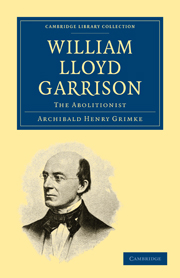Book contents
- Frontmatter
- Preface
- Contents
- CHAPTER I The Father of the Man
- CHAPTER II The Man Hears a Voice: Samuel, Samuel!
- CHAPTER III The Man Begins his Ministry
- CHAPTER IV The Hour and the Man
- CHAPTER V The Day of Small Things
- CHAPTER VI The Heavy World is Moved
- CHAPTER VII Master Strokes
- CHAPTER VIII Colorphobia
- CHAPTER IX Agitation and Repression
- CHAPTER X Between the Acts
- CHAPTER XI Mischief Let Loose
- CHAPTER XII Flotsam and Jetsam
- CHAPTER XIII The Barometer Continues to Fall
- CHAPTER XIV Brotherly Love Fails, and Ideas Abound
- CHAPTER XV Random Shots
- CHAPTER XVI The Pioneer Makes a New and Startling Departure
- CHAPTER XVII As in a Looking Glass
- CHAPTER XVIII The Turning of a Long Lane
- CHAPTER XIX Face to Face
- CHAPTER XX The Death-Grapple
- CHAPTER XXI The Last
- Index
CHAPTER VII - Master Strokes
Published online by Cambridge University Press: 05 February 2012
- Frontmatter
- Preface
- Contents
- CHAPTER I The Father of the Man
- CHAPTER II The Man Hears a Voice: Samuel, Samuel!
- CHAPTER III The Man Begins his Ministry
- CHAPTER IV The Hour and the Man
- CHAPTER V The Day of Small Things
- CHAPTER VI The Heavy World is Moved
- CHAPTER VII Master Strokes
- CHAPTER VIII Colorphobia
- CHAPTER IX Agitation and Repression
- CHAPTER X Between the Acts
- CHAPTER XI Mischief Let Loose
- CHAPTER XII Flotsam and Jetsam
- CHAPTER XIII The Barometer Continues to Fall
- CHAPTER XIV Brotherly Love Fails, and Ideas Abound
- CHAPTER XV Random Shots
- CHAPTER XVI The Pioneer Makes a New and Startling Departure
- CHAPTER XVII As in a Looking Glass
- CHAPTER XVIII The Turning of a Long Lane
- CHAPTER XIX Face to Face
- CHAPTER XX The Death-Grapple
- CHAPTER XXI The Last
- Index
Summary
“Help came but slowly” to the reformer. With a single instrument he had stirred the nation, as no other man had done, on the slavery question. He had thrown the South into widespread excitement, and thawed the apathy of the North into widespread attention. He had won an almost instant hearing for his cause. But he knew that this was not enough. Effective as he had shown the weapon of the press to be, it alone was unequal to the conduct of prolonged agitation. And prolonged agitation Garrison clearly apprehended was to be the price of abolition. Back of him and the Liberator he needed an organized force, coadjutors like Aaron and Hur to hold up his arms during the mighty conflict on which he had now entered with the slave interests of the country. Those interests were organized, and because they were organized they were powerful. The sentiment of freedom he determined to organize and to render it thereby invincible. To organized wrong he designed to oppose organized right, confident that organized right would prevail in the end. He had knowledge of the utility of temperance societies in advancing the cause of sobriety among the people. He had learned from Lundy how much he had relied upon the union of men as anti-slavery helps. Garrison determined to summon to his side the powerful agency of an anti-slavery society devoted to immediate and unconditional emancipation. He had already made converts; he had already a small following.
- Type
- Chapter
- Information
- William Lloyd GarrisonThe Abolitionist, pp. 133 - 156Publisher: Cambridge University PressPrint publication year: 2010First published in: 1891



